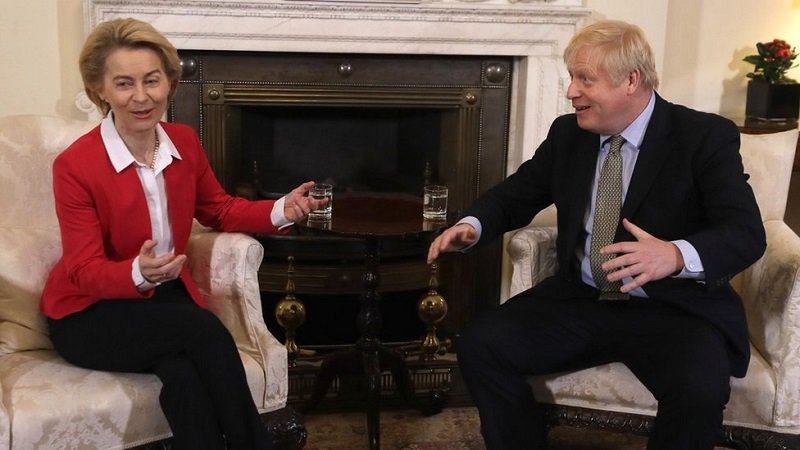Prime Minister Boris Johnson and EU Commission president Ursula von der Leyen will speak in a video call later, after negotiations over a post-Brexit trade deal broke up without agreement.
Both sides are calling on the other to compromise on key issues, including fishing and government subsidies.
Mr Johnson told the Daily Telegraph chances of a deal are “very good” if everyone “exercises some common sense”.
He also said he remains “optimistic” about a Canada-style relationship.
It comes after Mrs von der Leyen called for talks to “intensify”, as both sides set an October deadline to settle their differences.
After six months of trade talks with the EU, the UK’s top negotiator Lord Frost claims the outlines of an agreement are visible.
But without further compromise from the EU, he warns, differences over the contentious topic of fishing may be impossible to bridge.
Downing Street has always insisted that if there is no deal on fish, there will be no deal at all.
Mrs von der Leyen has said she hopes the video call with the prime minister on Saturday afternoon will create a pathway to securing an agreement, but she is likely to tell him the UK must show more willingness to abide by EU competition rules to gain full access to the single market.
It has long been assumed an intervention at the highest political level would be needed to get a breakthrough.
And according to the BBC’s Brussels correspondent Nick Beake, another guaranteed topic of conversation will be Downing Street’s insistence that it will override parts of the Brexit divorce deal which was agreed last year.
Although the government insists this is only a safety net to protect the peace process in Northern Ireland, the EU says it will refuse to sign any new trade agreement as long as the most controversial parts of the internal market bill remain in place.
‘Common sense’
Speaking to the Telegraph, the prime minister said the chances of a deal “are very good if everybody just exercises some common-sense and looks at the deal that is there to be done”.
He added that the UK had always been “very clear what we want – we want a Canada-style relationship”.
“We have been members for 45 years, and I don’t see why they can’t have the same deal with us, so I’m pretty optimistic,” he said.
News of the talks between Boris Johnson and Ursula von der Leyen is significant and Saturday cannot be dismissed as more blah blah in the Brexit process.
Speculation is rife, of course, as to why the prime minister and the EU Commission president have suddenly scheduled their digital tête-à-tête.
In general, it’s interpreted as a positive sign.
The accepted wisdom has always been that negotiating teams can only make so much progress.
And that the final push – the politically tough decisions on how much to compromise on the final sticking points – would have to come from up high.
But we’re not there yet.
It’s possible the prime minister and Mrs von der Leyen are talking today to explore who is really willing to make what compromises on the final outstanding issues.
For now, the why’s and what’s of Saturday’s talks are pure speculation.
The only thing we know for sure: the UK and EU say they want a deal – though not at any price.
Yet if and when a deal eventually emerges, both sides will have had to make compromises.
The UK formally left the EU in January, but entered a transition period – where the UK has kept to EU trading rules and remained inside its customs union and single market – to allow the two sides to negotiate a trade deal.
Formal talks began in March and continued throughout the pandemic, but there has been concerns over whether a plan would be agreed before that period runs out on 31 December.
Issues that have become particular sticking points between negotiators are state aid – where governments give financial support to businesses – and fishing rules.
The EU has said a deal must be reached before the end of October to allow it to be signed off by the member states before the end of the year, while Mr Johnson has said both sides should “move on” if agreement was not reached by the middle of the month.
If a deal is not done, the UK will go on to trade with the bloc on World Trade Organisation rules.
In a statement, Lord Frost said the final round of negotiations had been “constructive” but “familiar differences remain”.
On fishing, he said the gap was “unfortunately very large”, and he called for the EU to “move further before an understanding can be reached” on state aid.
The negotiator added: “I am concerned that there is very little time now to resolve these issues ahead of the European Council on 15 October [the deadline set by the PM to reach a deal].
“For our part, we continue to be fully committed to working hard to find solutions, if they are there to be found.”
His EU counterpart Michel Barnier agreed the negotiations had been conducted in a “constructive and respectful atmosphere”, with some “positive new developments on some topics” – such as aviation safety and police cooperation.
But he said there was “a lack of progress on some important topics”, such as climate change commitments, “as well as persistent serious divergences on matters of major importance for the European Union”, including state aid and fishing.
He added: “We will continue to maintain a calm and respectful attitude, and we will remain united and determined until the end of these negotiations.”BBC

